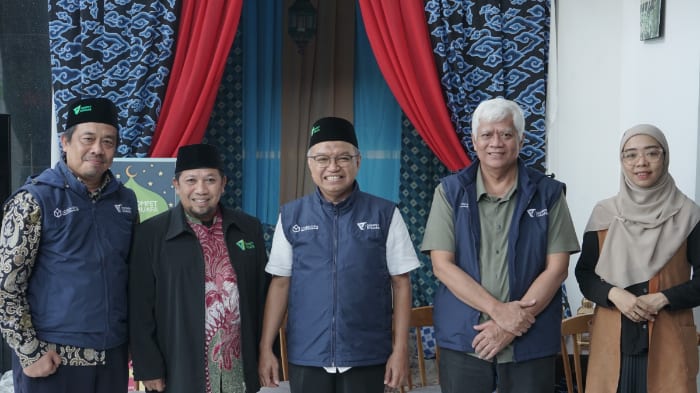AUSTRALIA — Dai Ambassador Dompet Dhuafa 2023 officially departed after the ceremonial release of the 14 countries at the Philanthropy Building, South Jakarta, on Monday (20/03/2023). Through the Dompet Dhuafa Da’wah Service Department, these Dais are assigned to spread Islam targeting Muslims living abroad related to Islam and Ziswaf. One of the targeted countries is Australia.
In previous years, there was only one Dai who departed for Australia, but now there are four Dai who goes to preach to the Kangaroo Country. The four Dai are Ustaz Dr. H. May. Dedu, Lc, M.Esy, Ustaz Deni Hamdani, M.Ag, Ustaz Yendri Junaidi, Lc, MA and Ustaz Samsul Fajeri.
“This is the second time I have set foot in Sydney, Australia. If in 2017 I was alone, then in 2023 we will come with four of us; Dompet Dhuafa’s envoy to preach during Ramadan 1444 H in Australia,” said Ustaz Yendri Junaidi in his travel notes to Dompet Dhuafa in Jakarta.
Also Read: Syiarkan ZISWAF ke Mancanegara, Dompet Dhuafa Gelar Seremonial Pelepasan Dai Ambassador

The air in Sydney is now in a transitional period, from summer to winter. When he arrived there, Dai Ambassador Dompet Dhuafa, who had just arrived, was immediately greeted by Ustaz Cecep Haji Solehudin, Lc. as the Head of Dompet Dhuafa Australia. He picked up Dai from the airport at Dompet Dhuafa Australia headquarters in Bankstown, Sydney.
On the way to the Dompet Dhuafa office, Ustaz Cecep also told the story.
“Among Australian cultures, it expresses things for what they are. Not so much ‘consider’ other people’s feelings or responses. This is also present in children. So if you teach your children and express that you don’t like this way, don’t feel comfortable with it, and so on, you don’t immediately get offended. Such is the culture here. Maybe this is different from our culture as Asians, let alone Malays,” he said.
Responding to the above story, Ustaz Yendri said, “I see this there are positives and of course, there are negatives. On the positive side, freedom in expressing feelings and opinions is evidence of a healthy person.”
Also Read: Dompet Dhuafa Gelar Training Dai Ambassador 2023, Siap Berdakwah ke Penjuru Dunia

He also explained that in many hadiths, the Holy Prophetsa did express what he felt as it was. In a sahih hadith it is narrated:
عَنِ ابْنِ مَسْعُودٍ رَضِيَ اللَّهُ عَنْهُ قَالَ: سَمِعْتُ رَجُلًا قَرَأَ آيَةً، وَسَمِعْتُ النَّبِيَّ صَلَّى اللهُ عَلَيْهِ وَسَلَّمَ يَقْرَأُ خِلاَفَهَا، فَجِئْتُ بِهِ النَّبِيَّ صَلَّى اللهُ عَلَيْهِ وَسَلَّمَ فَأَخْبَرْتُهُ، فَعَرَفْتُ فِي وَجْهِهِ الكَرَاهِيَةَ، وَقَالَ: «كِلاَكُمَا مُحْسِنٌ، وَلاَ تَخْتَلِفُوا، فَإِنَّ مَنْ كَانَ قَبْلَكُمُ اخْتَلَفُوا فَهَلَكُوا
From Ibn Mas’ud (ra), he said: “I heard someone reciting the verse. While I had heard the Prophet (peace be upon him) recite the same verse differently. I also took the man to the Prophet (peace be upon him). I saw on the face of the Prophet an expression of dislike. Then he said: “You are both right. Do not dispute. Behold, the people before you quarrelled at all they perished.””
Furthermore, Ustaz Yendri explained that the Prophet (peace be upon him) showed expressions of dislike as they were so that they were visible to Ibn Mas’ud. The Prophet did not show a ‘fake’ smile, while inwardly did not like it. What feels in the heart is what appears on the face.
Also Read: Kemenag dan Kemlu Apresiasi Para Dai Ambassador
“That’s the positive side. The negative side when freedom of expression does not consider the situation, conditions, and character of the person being spoken to. Of course, this will make communication not smooth because some feel unappreciated and uncomfortable,” wrote Ustaz Yendri.
Therefore, according to him, freedom of expression must also pay attention to differences in culture and character of the people we interact with so that communication remains smooth and does not experience significant obstacles.
Wallahu a’lam…
(Dompet Dhuafa/Yendri Junaidi, Lc, MA/Awalia R)


